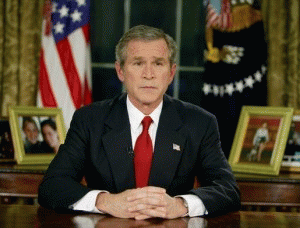Reprinted from Consortium News
What surprised me most about the Iraq War wasn't how wrong the expectation of happy Iraqis showering American troops with flowers was or even how badly the war would turn out -- all that was predictable and indeed was predicted. But what I didn't expect was that the U.S. government would ever admit that there were no WMD stockpiles.
I assumed that the U.S. government would do what it usually does: continue the lie to protect its "credibility." Because that is what "credibility" has become -- powerful institutions and people maintaining the aura of being right even when they're completely wrong.
There is even a national security argument to be made: If the U.S. government must justify its actions to the American people and the world with propaganda themes, it can't simply admit that previous ones were lies because then it would lose all "credibility." The next time, the public might not be as open to the propaganda. The people might catch on.
And that would present a problem to the U.S. government, which feels it needs the approval or at least the confused acquiescence of the American people and to a lesser extent the world before charging off to war or starting some expensive confrontation with a foreign power.
So, in a sick kind of way, it makes more sense to stick with the lie and rely on a corrupted mainstream media to hold the line. Anyone who dares challenge the falsehoods then can be discredited or marginalized.
That's why I was surprised when the U.S. government admitted that there were no WMD stockpiles in Iraq and no active nuclear-weapons program, either. I was expecting that President George W. Bush's team would assemble some buckets of chemicals found at Baghdad swimming pools -- pile them up in front of a credulous media -- and announce, "we got here just in time!"
After all, the U.S. government rarely corrects its misstatements and outright lies, no matter how significant they may be. For instance, there's never been a formal admission that the Gulf of Tonkin claims, which launched the Vietnam War, were false.
On a smaller scale, I encountered something similar when I was covering the U.S. invasion of Grenada in 1983. The Reagan administration massively exaggerated the discovery of some useless World War I era rifles in a musty-smelling warehouse to claim that the little Caribbean island was about to be transformed into the hub of terrorism for the Western Hemisphere.
As absurd as the claim was, it worked well enough amid a well-staged propaganda campaign complete with American students kissing the tarmac when they returned to the United States and members of Congress waving around some Grenada government contracts -- in Russian.
Dig in the Heels
We are now seeing similar dig-in-the-heels strategies regarding Syria and Ukraine. Though I'm told that U.S. intelligence knows that the Obama administration's propaganda is no longer operative on the 2013 sarin gas attack outside Damascus and the 2014 shoot-down of the Malaysia Airlines Flight 17 in eastern Ukraine, the storylines won't be retracted or corrected.

Syrian President Bashar al-Assad.
(Image by (Photo credit: Fabio Rodrigues Pozzebom / ABr)) Details DMCA
To do so -- to say that President Bashar al-Assad's forces weren't responsible for the sarin attack and that the Russians weren't behind the MH-17 catastrophe -- would destroy the propaganda narratives that have been useful in justifying the shipment of arms to Syrian rebels and the launching of a new Cold War against Moscow.
If the American people and the world public were informed that they had been misled on such sensitive topics -- and that the real guilty parties might include people getting American support -- that could devastate U.S. government "credibility" and disrupt future plans.
Therefore, mounting evidence that Assad didn't cross President Obama's "red line" against using chemical weapons on Aug. 21, 2013, must be brushed aside or forgotten.
(Note: You can view every article as one long page if you sign up as an Advocate Member, or higher).






